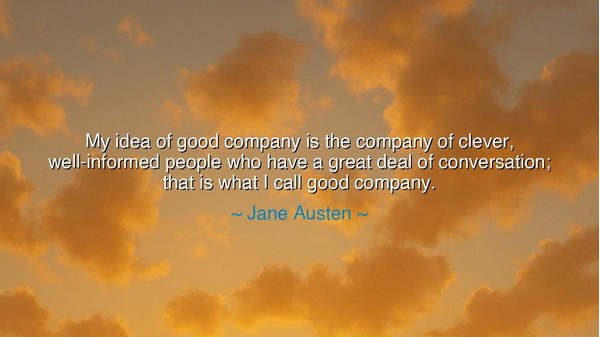
My idea of good company is the company of clever, well-informed
My idea of good company is the company of clever, well-informed people who have a great deal of conversation; that is what I call good company.






“My idea of good company is the company of clever, well-informed people who have a great deal of conversation; that is what I call good company.” Thus wrote Jane Austen, the quiet observer of hearts and manners, whose words still echo like soft bells across the centuries. In this simple sentence lies the wisdom of one who knew that true companionship is not born of wealth or status, but of intelligence, understanding, and spirited conversation. For to her, good company was not measured by the glitter of the ballroom or the size of one’s fortune, but by the meeting of minds—the exchange of ideas that awaken thought and feed the soul.
Austen lived in an age where society often prized appearance above depth, where conversation was frequently bound by politeness and pretense. Yet, she saw beyond such illusions. Her novels—Pride and Prejudice, Emma, Sense and Sensibility—are filled with scenes where speech reveals the true measure of a person. The foolish chatter of the vain and the thoughtless exposes their emptiness, while the witty and perceptive shine not because they are loud, but because their words carry substance. For Austen, conversation was the mirror of the soul, and to be in the presence of those who could think, reason, and laugh with sincerity was the highest form of pleasure.
The origin of this wisdom lies in the human longing for connection that transcends the superficial. To sit among clever and well-informed people, as Austen says, is to dwell in the company of those who question, who listen, who see the world with curiosity and grace. It is not the cleverness of arrogance she speaks of, but of liveliness—the kind that sparks imagination and draws others into a dance of ideas. Such company uplifts the spirit because it reminds us that the mind, like the heart, hungers for nourishment. The words we share can either confine us to smallness or free us into understanding.
There is a story told of Socrates, the ancient philosopher, who wandered through the streets of Athens engaging in endless dialogue. He sought not flattery or fame, but truth, believing that through questioning and discussion the soul could grow. His companions were not chosen by birth or title, but by the quality of their minds. In this, he and Austen shared the same conviction—that conversation is the highest form of companionship, for it awakens the intellect and refines the heart. The difference between idle talk and true dialogue is the difference between noise and music.
In Austen’s world, good company meant the kind of gathering where laughter and insight flow together, where people speak with honesty and listen with respect. It was in such circles that character was revealed, friendship was forged, and wisdom was cultivated. She reminds us that conversation is not merely an exchange of words, but a communion of souls. When we converse deeply—with wit, compassion, and curiosity—we bridge the distances between us and remind ourselves of our shared humanity.
Yet how easily this art is lost in the haste of modern life. Too often we fill silence with distraction rather than thought, or speak without truly hearing. Austen’s words call us back to a simpler, nobler ideal: to seek companions who challenge us, who inspire us to think more clearly and feel more deeply. To sit in such company, even for an hour, is to be reminded of the beauty of the mind, the joy of understanding, and the sacredness of sincere dialogue.
The lesson, then, is both gentle and profound: surround yourself not with those who merely pass the time, but with those who enrich it. Choose company that sparks your intellect and stirs your heart. Be the kind of friend who listens as eagerly as you speak, who values wisdom more than gossip, and who brings light into conversation rather than shadow. In a world that often favors noise over meaning, be the voice that seeks truth, humor, and grace.
So, my child, when you gather with others, do not ask, “Are they fashionable?” or “Are they admired?”—ask instead, “Are they thoughtful? Are they kind? Do their words make my spirit brighter?” For as Jane Austen knew, good company is not a luxury—it is a necessity for the soul. Seek it, cherish it, and become it. And when you speak, speak as one who knows that conversation, when guided by intelligence and sincerity, is one of the purest expressions of life itself.






AAdministratorAdministrator
Welcome, honored guests. Please leave a comment, we will respond soon